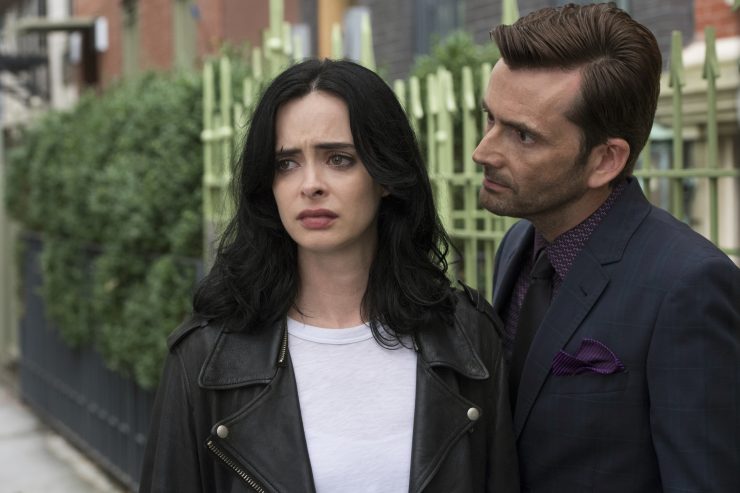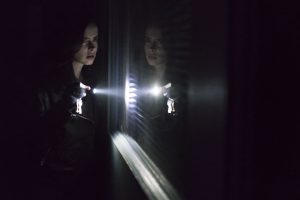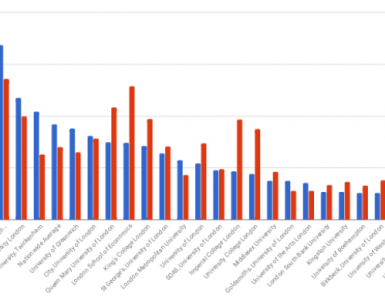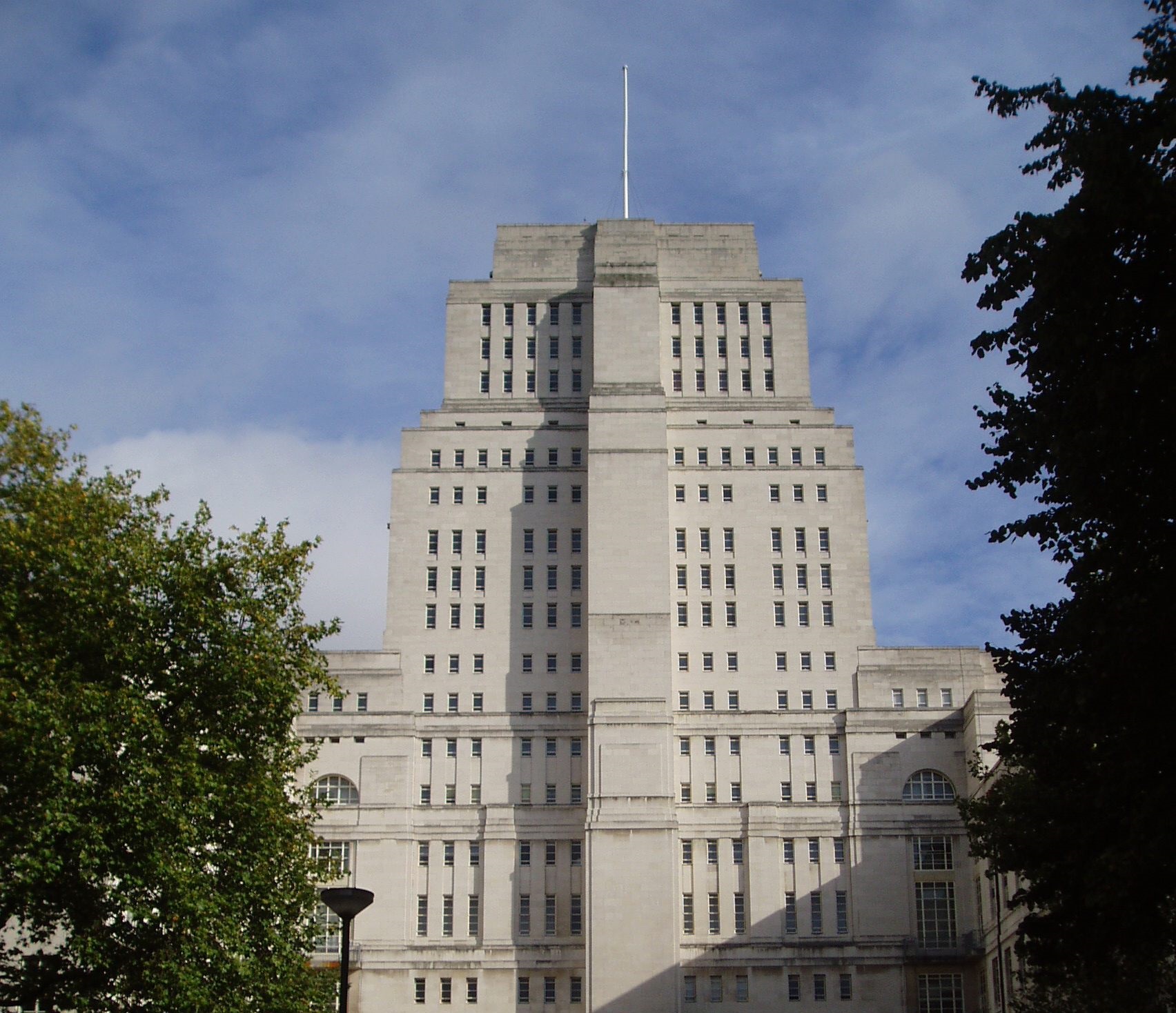With the second season of Jessica Jones underway, our arts contributor Sauleha Kamal asks what it takes to be a true superhero in the Marvel universe. (Have your whiskey bottle and leather jacket to hand, as there are some shocking spoilers ahead).
Netflix Marvel heroes have a tendency to avoid the label of hero, preferring instead to defend their homes and loved ones as vigilantes operating in the shadows, always at odds with questions of morality and justice. Season 2 begins with Jones thrust in the spotlight leaving her predictably uncomfortable. At its core, this season is an exploration of heroism and everything that comes with accepting the label of hero. The success of this exploration is debatable, but its commitment to exploring the question from so many angles is admirable. The divisive nature of the question is apparent in the fact that the ‘team’ is splintered when it signs off.
Season 1 of Jessica Jones closed with a shot of our protagonist in her apartment-office avoiding phone calls from strangers in need of a hero. Fresh from killing her abuser – the chilling, mind-controlling Kilgrave – in front of a crowd of people he had taken captive, Jones has begun to develop a reputation as a superhero. As she sits behind her perpetually-broken Alias Investigations door, however, she feels nothing like one. Her Defenders’ arc also finds Jones rather reluctantly help save New York in between nursing bottles of alcohol to forget her traumas. Season 2 opens with Jones waking up to a series of nightmares about her past she cannot understand, let alone expunge. As adoptive sister and former child star Trish Walker urges Jones to look into her past and the shadowy entity known as IGH (who gave her powers after non-consensual experimentation), these nightmares set into motion the events that define season 2. That, however, is not immediately clear as the first half of the season flounders across a series of plotlines: a super-powered killer is on a murder spree, Simpson is back, IGH remains shadowy and elusive, a rival PI spars with Jessica, Trish falls short of her ambitions and so on.
Much of what was great about the first season had to do with its deft handling of consent and trauma through Kilgrave, as unsettling as he is alluring, played to perfection by David Tennant..
Considering the well-deserved applause on which season 1 closed the door, the first half of the season 2 is disappointing. The pacing is off, the plotlines too many and the build up too prolonged. One can’t help but wonder if Jessica Jones can survive the death of Kilgrave. After all, much of what was great about the first season had to do with its deft handling of consent and trauma through Kilgrave, as unsettling as he is alluring, played to perfection by David Tennant. But the second season is not about the quick reward; it’s a thoroughly realistic slow burn. The messy first few plotlines are only a distraction from the impending revelation: that season 2 is a complicated mother/daughter story used to usher in Jones’ next chapter.
This answer arrives at the end of episode 6, ‘AKA Facetime’, when it is revealed that the mysterious ‘monster’ that Jessica and company have been following is in fact her mother Alisa Jones, drastically altered by the IGH experiments that saved her life. This is where the real trouble begins: like Jessica, Alisa has super strength but, unlike her daughter, she suffers side-effects in the form of a horrifying tendency towards murderous rage and violence. Alisa is well-intentioned (deep inside she is still the warm mother Jessica remembers – this is most apparent when she reunites Vido and Oscar) and super-powered; but she cannot be a superhero while unable to control or comprehend the immorality of her sporadic bursts of violence. Yet, Alisa almost dies a hero’s death when she leaps into the wreckage of a burning car to rescue a family with no regard for her own personal safety. She disappears into rising flames and, for a moment, there is silence. If Alisa had died at that moment, it would be a neat end – a heroic death for the anti-hero mother Jessica desperately wants to fix – but this is not the show for neat ends. Alisa emerges from the wreck only to be messily gunned down near the end.
The second season feels so different because it tracks the journey from trauma to acceptance…If season 1 was our introduction to the tumultuous world of the traumatized Jessica, season 2 is the origin story of Jessica Jones, superhero…
There are other instances of lost hero potential. There’s the man behind IGH, Dr. Karl Malus, who began his journey with the intention of saving lives and descended, along the way, into mad, unethical experimentation. A Victor Frankenstein for the Marvel set, Malus at least attempts to take some responsibility for his actions in quarantining Alisa from society. That he continues to cling to delusions of grandeur (apparent in his last scenes with Trish) is his coup d’état, as he perhaps realises when he lets himself die.
It’s also no coincidence that this season sees Trish Walker, the foil to Jessica’s reluctant hero, become a desperate wannabe-hero. While Jess is barely able to keep herself afloat, Trish craves meaning that allows her to rise above victimhood. Jealous of Jess’s powers and war correspondent and boyfriend Griffin’s natural charm, Trish wants to emerge from the shadow of her super-powered friend and successful boyfriend to become her own kind of champion. Recall that in season 1, this desire for self-sufficiency manifested in her learning self-defence and turning her apartment into an impenetrable fortress; in season 2, just saving herself is not enough. Fresh off a reminder of her #MeToo moment and frustrated with her inability to do large-scale good, Trish spirals into a dangerous addiction that ends in a crazed attempt to gain superpowers. As Jess strives to, literally and figuratively, run from heroism, Trish almost dies trying to become a hero. Jeri Hogarth, meanwhile, chases down her own self-serving brand of vigilante justice in a B-plot that is equal parts compelling and chilling, and Malcolm emerges from the madness ready to carve an identity he can call his own.
If season 1 was our introduction to the tumultuous world of the traumatized Jessica, season 2 is the origin story of Jessica Jones, superhero. Reviewers have noted before that the Jessica Jones in the comics isn’t a barely functional PTSD sufferer, but a well-adjusted superhero in a teal-and-silver outfit, spandex and all. This season might be what takes Jones from A to B (don’t hold your breath for this Jessica to don a superhero outfit anytime soon though), transforming the long-suffering vigilante into a full-blown superhero. As Jones learns from her ill-fated attempt to drive away with her mother, she cannot simply walk away from her life or even float through it. If she is to live her life, she must shed her past—a fact that becomes clear when episode 11, ‘AKA Three Lives and Counting’, finds Jessica throwing away her iconic black leather jacket, a relic of her carefree days with her college boyfriend.
It isn’t an external villain who tries to destroy everything but parts of Jones’ own personal narrative that implode from within…
For the new superhero Jessica Jones to emerge, however, Alisa must barrel through her daughter’s idyllic memories of life before the accident, IGH and Kilgrave. Only when those moments are reconciled with reality can Jessica begin to see her trauma clearly and work past it. Here, it isn’t an external villain who tries to destroy everything but parts of Jones’ own personal narrative that implode from within. Make no mistake, Jones, though reluctant to acknowledge it, has long been a hero with a strong moral code and that is what leads her to despise Alisa’s methods and turn her mother in, despite her desire for a family. Jones’ past and future pull at her throughout the season but in the end, the reality is apparent.
For the first time since the camera panned on the private eye crouched in a windowsill, camera in hand, Jones may be whole (her relationship with Trish, a glaring exception) and ready to live life. In many ways, then, season 2 is a set-up to the Jessica Jones universe to come. Does it stutter and stumble? Yes. Chalk it up to growing pains. But when Jessica Jones returns it will be a more confident show featuring a more confident hero. What was so successful about season 1 had to do with trauma, questions of agency and victimhood. Season 2 feels so different because it tracks the journey from trauma to acceptance.
“Dimming our life, limping our way through life. That is not an option. Not with the gifts we have,” Alisa, disturbed though she may be, tells Jones in an insightful moment that charts the course for Jess. By the end of the second season, Jessica Jones is no recovering victim, nor is she someone who is thrust into vigilantism, this time – apparent in the bodega moment – Jessica embraces heroism. As she regales a wide-eyed Vido with the story of that particular ‘superhero moment’, it is evident that Jessica Jones, superhero, has arrived.
Marvel’s Jessica Jones, Season 2, is on Netflix now.

















